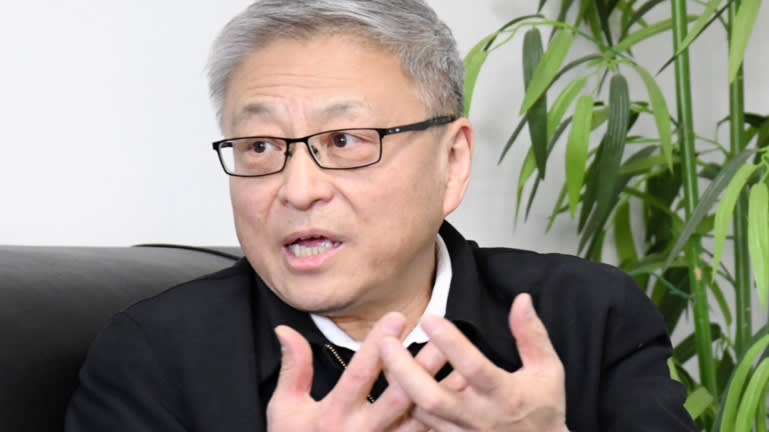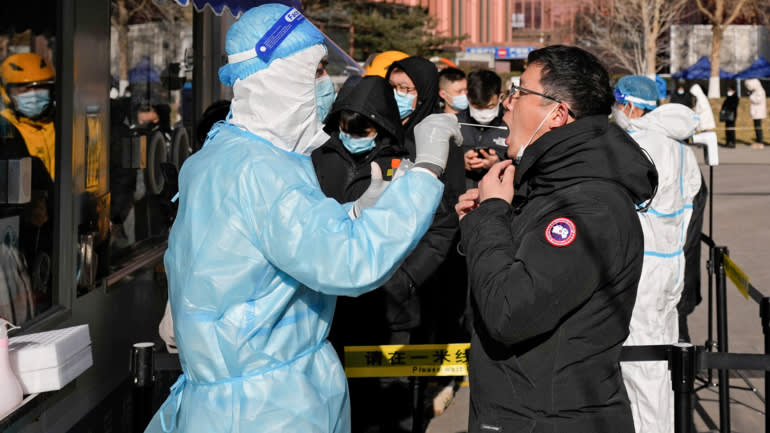From leader to students, overconfidence clouds China
“Overconfidence is bad for China’s development.” So said a Chinese economist when the latest gross domestic product figures were announced on Monday.
A positive take would be to focus on the 8.1% growth for the full year of 2021, pushing the Chinese economy to as much as 80% of the U.S. economy in dollar terms. But a more recent snapshot shows meager 4% growth in the October-December quarter.
“Given the serious economic slowdown we are currently facing,” the economist said, “the day China surpasses the U.S. is moving away, not coming closer.”
Meanwhile, on the subject of overconfidence, a prominent scholar’s shocking analysis has been widely talked about in China.
Yan Xuetong, director of Tsinghua University’s Institute of International Studies, sounded the alarm in a recent lecture about the unbelievably biased views of today’s students.
Chinese university students born in 2000 or later, Yan said, “usually have a strong sense of superiority and confidence, and they tend to look at other countries from a condescending perspective, look at international relations through wishful thinking and believe that China’s foreign policy goals can be achieved easily.

“They think humankind’s universal values such as peace, morality, fairness and justice are China’s inherent traditions. They think that only China is just, while other countries, especially Western countries, are evil.”
Yan and his observations of these tendencies at his elite university, from which President Xi Jinping graduated, created shock waves.
The Tsinghua director pointed out that the impact of extreme opinions expressed on the internet is particularly serious and said students believe even dubious “conspiracy theories” advocated by online celebrities, regarding them as common sense.
Yan believes the way of thinking he has observed will lead to problems in the future. As such, he has suggested that teachers of international relations should train students to see China’s history and understand its complexity, and help them to appreciate the diversity of the world.
Yan is a leading scholar of China’s realist camp. A decade ago, he declared that Deng Xiaoping’s “conceal ambitions and hide claws” principle of foreign policy was outdated and foresaw intensifying friction between China and the U.S.
Xi had just become China’s top leader, and as he and Yan had similar ways of thinking, the scholar gained clout and prominence.
But even Yan – an advocate for a tough stance on the U.S. – now believes the current trend is too much.
The arrogant and reckless way Chinese students think is the direct result of patriotic education, to which Chinese Communist Party leadership has attached importance.
Only a year ago, China’s newfound confidence was considered a good thing. China was touting itself as the only country to successfully contain COVID-19 and recover economically from the pandemic.

Jin Canrong – a professor at Renmin University of China and an associate dean of the university’s School of International Studies – said that China would catch up with the U.S. in 2025 in terms of GDP, then overtake the U.S. in 2035 in terms of real scientific and technological capabilities. Its military supremacy in both the Western Pacific and the Indian Ocean would become clear by then, Jin added.
In terms of industrial production capacity, the U.S. will be no match for China, and China will overtake the U.S. in terms of comprehensive national power, resulting in its greater international influence, Jin said. These remarks were made about a month before top American and Chinese diplomats clashed during a meeting in Alaska last March.
Behind Jin’s confidence was economic stagnation in the U.S., which some analysts pointed out had failed in its response to the pandemic.
Opinion pieces talked of declining U.S. national power, and Xi, who doubles as the party’s general secretary, was repeatedly stressing “confidence in the system,” meaning the party’s governance.
But this month things took a turn for the worst. On Saturday, the first case of the omicron coronavirus variant in Beijing, China’s capital, was confirmed.
On Monday, it emerged that in 2021 births in China fell for the fifth consecutive year and to their lowest level since the People’s Republic of China was founded in 1949. This presages the arrival of societal depopulation.
After failing in its initial response to the coronavirus outbreak in Wuhan, Hubei Province, the Xi administration adopted a strict zero-coronavirus policy.

In the second half of 2020, it came to be believed within China that the Xi administration completely succeeded in containing the virus.
As the Chinese economy recovered rapidly until the first half of 2021 and Western economies slumped, the Xi administration became overly confident. This created an elevated mood in Chinese society, with a hint of narcissism.
The “third resolution on history,” adopted at the sixth plenary session of the party’s 19th Central Committee in November, includes multiple mentions of confidence.
As Xi aims for a third term as China’s top leader at the party’s next quinquennial national congress this coming autumn, the country’s “successful experience” with its zero-coronavirus policy has already been factored in as the leader’s political achievement.
It is now impossible to change the policy.
There will, therefore, likely be strict movement restrictions during the long Chinese New Year holiday period, which begins later this month, as well as before an annual session of the National People’s Congress, China’s parliament, in March, and before the party’s national congress, in the fall.
Said one person living in the northern part of China: “I cannot return home during the Chinese New Year holiday period for the first time in the past three years. There will be a significant impact on consumption.”
Another person, living in the southern part of the country, complained that all citizens have been ordered to take a PCR test within 24 hours. “This is the third time that we have been ordered to do so,” the southerner said. “I don’t want to, but what can I do?”
With the Beijing Winter Olympics to open on Feb. 4, it is likely that various parts of the country will impose across-the-board restrictions against people trying to travel home.

Strong downward pressure will weigh on the Chinese economy beginning with the first quarter of 2022. Some economic experts say that although they expect the economy to pick up in the second half of this year, it will be considerably difficult to achieve 5% growth.
In addition to the zero-coronavirus policy, there have been human-made errors. Rapid and rigid orders from Beijing’s Zhongnanhai, where Chinese leaders have their offices, are dragging down the economy. Policies have hurt the housing market, which greatly contributes to the economy. Pressure on tech giants as well as on the gaming and education industries has made matters worse.
In late 2021, the Japan Center for Economic Research predicted that China’s nominal GDP will exceed the U.S.’s in 2033, as many as five years later than its previous forecast.
Only a year ago, the JCER had predicted China would overtake the U.S. in terms of nominal GDP “as early as 2028.”
As reasons for the delay, the JCER cited two factors: slowing productivity growth due to tougher Chinese government regulations on private companies and a labor shortage due to a long-term population decline.
The first factor is a side effect of Xi’s abrupt and extreme policies. One could say Xi himself is a risk to the Chinese economy.
One Chinese political source whispered: “If Xi fails to improve the economic situation by the Communist Party’s national congress in autumn, it could affect his power.”

After all, the grand goal of “basically realizing a socialist modernization by 2035” was set by Xi himself, with fanfare, at the party’s last national congress, in 2017.
The explanation given back then was that Xi had brought forward China’s goal of overtaking the U.S. by around 15 years. A duty Xi imposed on himself, he cannot afford to see the plan fall through.
But Xi and his team have brought about a “policy-induced slump.” Overconfidence has driven not only China’s top leaders but also its bureaucrats and ordinary citizens, including Tsinghua University students, into near narcissism, clouding their objective judgment.
On Monday, the news of China’s economic slowdown in the last quarter of 2021 sent shock waves around the world. On the same day, Xi delivered a speech at a World Economic Forum-related meeting via video.
“Shifts in the domestic and international economic environment have brought tremendous pressure,” he said, “but … we have every confidence in the future of China’s economy.”
Is his “confidence” different from the problematic overconfidence that is seen at home and abroad? Will it lead to flexible policy adjustments? It is too early to say.
Author: KATSUJI NAKAZAWA, NIKKEI Asia


